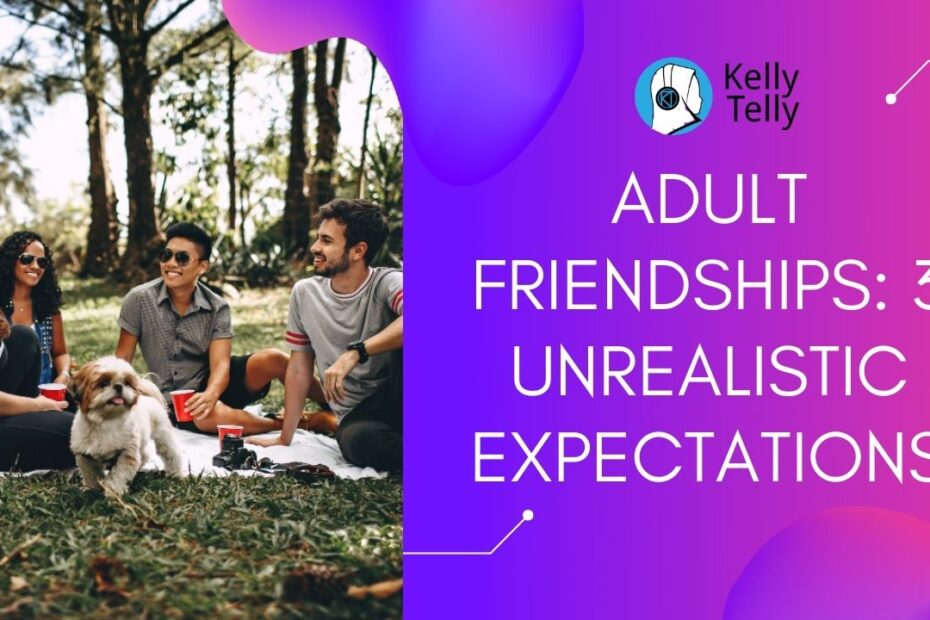As an adult, what do you think about friendship? Maybe a scene like in the show Friends or How I Met Your Mother pop up in your head? Where a clique of friends gathering every night for fun, and they stick together with you for the rest of your life?
Well, I have some good news and bad news for you. The bad news is, adult friendships are not accurately portrayed by these memorable shows. The good news is, you’re not the only one thinking that way. Understandably, they are shows that are produced ultimately only to entertain people. Thus, it is us who must adhere to the reality of life; identifying what unrealistic expectations that we have developed about friendship as adults and eliminating them.
Why? Because having unrealistic expectations is a key to a damaging relationship. If someone fails to fulfil your expectations, you will feel unnecessary resentment towards what is supposedly normal for other people to do. And the vice versa is not that good either. If you’re genuinely tolerating others, you might put yourself with those unreasonable expectations, unnecessarily trapping yourself with a sense of worthlessness whenever you fail to meet them.
And in this article, I’m going to share three of them.
I must have a best friend where I can tell them anything and everything. / I must have a group of friends with me together forever.

Extroverts may have that fantasy of having a friend group that will always, and I mean always, be available for you. Conversely, while introverts may have no such desire, they may jump from one close friend to another, trying to find ‘the best friend’ who will click on everything.
You see, ‘best friend’ or ‘the gang’, they are just labels that we bestow on our friends, if our friendships are reciprocated (whether both parties regard the other to be a friend). It’s that subjective feeling in your heart that matters; reciprocation. So rather than measuring by numbers, try to measure your friendship on how reciprocated you feel.
A good suggestion would be categorizing our friends into into A, B, C, and D groups so that we don’t “have A expectations from a person who belongs in a C group”:
- Group A: your closest friends, with whom you feel comfortable being completely yourself. You don’t judge each other, and you’ve gained their trust.
- Group B: those you trust less than those in Group A.
- Group C: acquaintances, co-workers, and people who have been demoted friends from the B-group, and friends of friends.
- Group D: persons with whom you are obliged to be social with (e.g., your boss, some co-workers, certain family members).
Don’t feel bad about having to categorize your friends. Having unrealistic expectations is much worse, as it can lead to many avoidable aggravations.
My close friends must fulfill all my social needs.

Extending from the first point, you might expect certain friends to always be there for you. To always pick up the phone when you call. To always give you a ride when you need one. To always be free to hear you rant. To always say the right words when you are crying.
In reality, your friends are occupied with their life, just like you are. They might miss some calls and messages from time to time. They are not always physically available to you. They might unintentionally say or do the wrong thing to you.
Hence, it is unrealistic to expect only a certain limited number of friends (or even worse only one friend) to fulfil all your needs. Taking the previous example, even all of our friends in group A cannot give us exactly what we need. Having one best friend or “our person” with whom we do everything and whom we confide in or turn to for assistance is no less special than having one best friend or “our person” with whom we do everything.
Friendships are supposed to be seamless.

Remember back then when you were a kid, where all you had to do to become a friend is just to say hi? Then bam! You’ll be hanging out, playing around together, being there when needed. Everything seemed seamless at that time.
Then why do friendships suddenly become very hard in adulthood?
A multitude of causes can be blamed for the reasons. Distance, time, and other commitments become obstacles in a manner they didn’t when everyone was young. Worse, despite the reality that people’s locations and employment are continuously changing in the real world, we don’t have strong models for how friendships should continue when they exist outside the range of convenient proximity.
Yes, having friends during childhood might be easy because you don’t have things that you have to do. But as you grow up, you have more responsibilities and commitments. School life is just the start. Ultimately, as you progress in life, friendship becomes a relationship that requires effort, commitment, and reciprocity. It’s not easy, even if you want to, and willing to do it.
So don’t beat yourself up too much if your friendship is not seamless; it is as hard as it sounds. What we need to learn is how to maintain our friendship despite our lifestyle; how to put that effort, commitment, and reciprocation in the best way that we can.
So there you have it, three unrealistic expectations we may have about friendships as adults. For sure, it is not easy to remove what was ingrained in our brains about friendship due to pop culture. But it’s worth trying.
Take note of any self-imposed friendship rules or views you have about your duty as a friend (i.e., your shoulds, musts, and have-tos). Then, replace these concepts with more practical, beneficial ones. For example, rather than saying to yourself “I have to make more friends”, you can say “I want to meet new people”.
And in doing so, don’t be too critical; it won’t make you want to put yourself out there and be vulnerable in the way that true, intimate friendships require. And finally, recognize that you are not alone in having this problem. We can all afford to consider how we can strengthen and expand our social networks and connections.
All the best!

